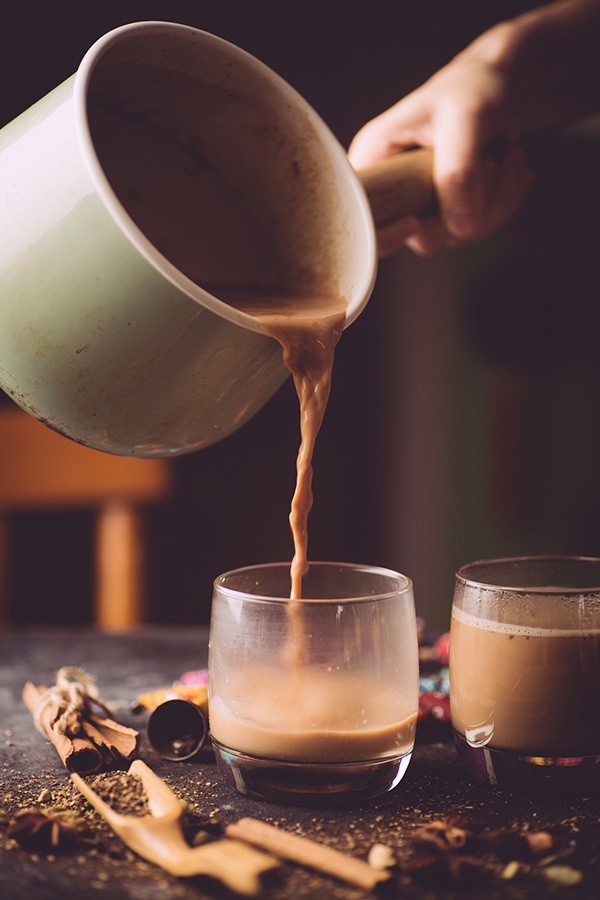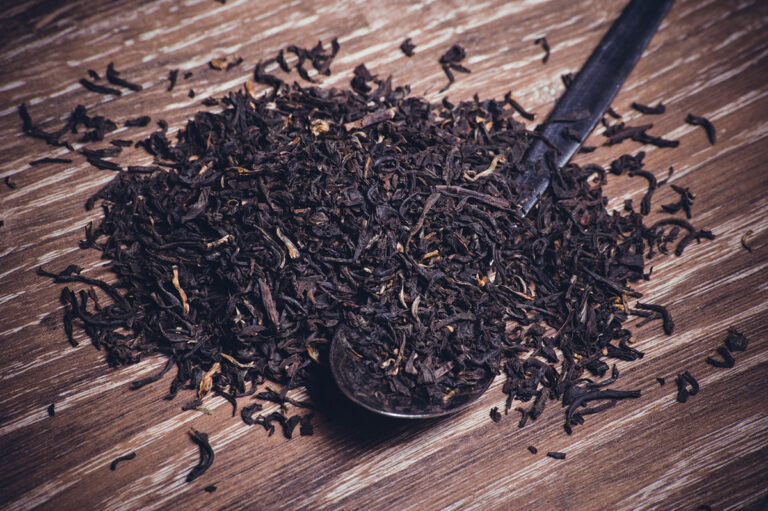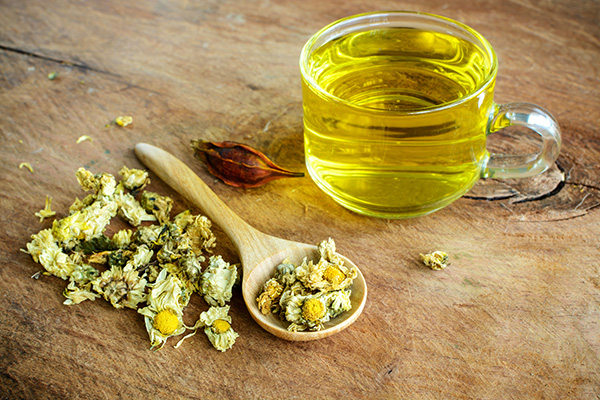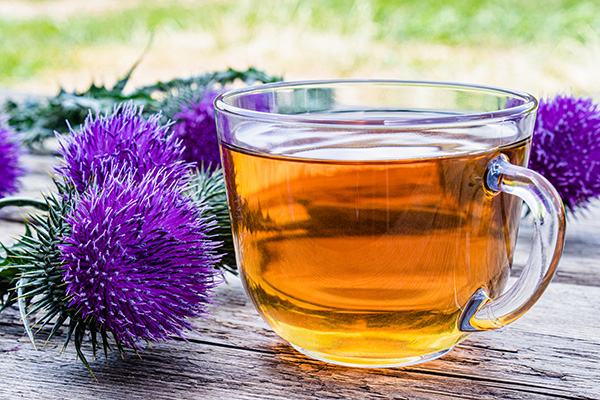Chai Tea: Benefits, Side Effects, and How to Make It
In India, chai is not just a beverage; it’s an integral part of the daily fabric of life. Whether on bustling trains, lively street corners, or in vibrant sari shops, you’ll find individuals relishing this sweet, spicy, and creamy drink.
Contrastingly, in the United States, “chai” has come to denote a specific type of tea distinguished by its cinnamon or cardamom-infused flavor. Yet, in India, chai is tea, pure and simple – the Hindi word for tea is “chai.” So when you say “chai tea,” you’re essentially saying “tea tea.” What is perceived in America as a highly specialized concoction is, in reality, just the standard method of preparing tea in India.

What Is Chai Tea?
Chai tea, known for its bold and robust flavors, is a blend of black tea and aromatic spices often associated with Indian cuisine. The exact ingredients can vary, but a traditional chai tea contains:
- Black Tea: The base of chai, black tea offers a deep, robust flavor. It’s rich in antioxidants and gives chai its characteristic depth and body.
- Cardamom: Known as the queen of spices, cardamom gives chai a sweet, floral note. Its scent is distinct and captivating, bringing an exotic touch to the blend.
- Cinnamon: This spice contributes a warm sweetness to the chai mix. Aside from its flavor, cinnamon is also prized for its potential health benefits.
- Ginger: Ginger adds a fiery kick to chai tea. It’s also celebrated for its health benefits, including its potential to aid digestion and soothe nausea.
- Cloves: These spice buds contribute to the warming character of chai. They carry a bold, slightly bitter flavor that adds to the complexity of the drink.
- Black Pepper: Often overlooked, black pepper adds a subtle heat to chai tea. It’s also said to enhance the absorption of the beneficial compounds found in other spices.
- Star Anise (optional): This star-shaped spice lends a sweet, licorice-like flavor to the chai. Not all recipes include star anise, but when used, it adds another layer to the taste experience.
- Fennel (optional): With its sweet and slightly licorice-like taste, fennel complements the other spices, enhancing the overall flavor profile of chai tea.
- Nutmeg (optional): Nutmeg offers a warm, slightly sweet flavor. It’s not commonly used in all chai blends, but it can be a delightful addition.
All these ingredients are steeped together and often served with milk, which adds a creamy richness to the strong, spicy flavors.
What Does Chai Tea Taste Like?
Chai tea is a true symphony of flavors. With every sip, your palate is greeted by a complex medley that’s spicy, sweet, fragrant, and warming all at once. The black tea base gives it a solid depth, while the spices impart their distinctive tastes – cardamom lends a sweet floral note, cloves add warmth, cinnamon brings a touch of sweetness, and ginger provides a fiery kick. If used, pepper and star anise add a spicy heat and sweet licorice-like flavor, respectively. When combined with the creaminess of milk, you get a comforting, well-rounded drink that’s perfect for any time of the day.
How Much Caffeine Is in Chai Tea?
The caffeine content in chai tea can vary based on how it’s made. However, on average, an 8-ounce cup of chai tea can contain around 40-60 milligrams of caffeine. This is less than what you’d find in a typical cup of coffee, which often contains over 100 milligrams of caffeine.
Chai Tea Benefits
There are several health benefits attributed to the consumption of chai tea.
Rich in Antioxidants
The black tea and spices in chai tea are loaded with beneficial antioxidants. These substances help protect your cells against oxidative stress and inflammation, promoting overall health.
Aids Digestion
The spices like ginger and black pepper in chai tea can aid in digestion. Ginger can help alleviate nausea, while black pepper facilitates better absorption of nutrients.
Boosts Heart Health
Regular consumption of black tea and certain spices like cinnamon may lower cholesterol and blood pressure, thereby contributing to heart health.
Has Anti-inflammatory Properties
Ingredients like ginger and cloves have anti-inflammatory properties that could help reduce inflammation and pain.
Chai Tea Side Effects
While chai tea offers several benefits, it’s also essential to be aware of potential side effects.
Can Cause Heartburn
Some spices in chai tea, such as ginger and black pepper, can cause heartburn or indigestion in some people, especially when consumed in large amounts.
Could Lead to Increased Heart Rate
The caffeine in chai tea can lead to an increased heart rate or irregular heart rhythm in some people, particularly those who are sensitive to caffeine.
Possible Allergic Reactions
Some people might be allergic to certain spices used in chai tea, leading to symptoms like itching, swelling, or difficulty breathing.
How to Make Chai Tea From Scratch?
Making chai tea at home allows you to adjust the ingredients to your liking. Here’s a simple recipe:
- Boil 2 cups of water in a pot.
- Add 2 black tea bags or 1 tablespoon of loose black tea.
- Add 2 crushed cardamom pods, 2 cloves, 1 cinnamon stick, and a small piece of ginger, grated.
- Let the mixture simmer for 10 minutes.
- Add 2 cups of milk and 2 tablespoons of sugar or honey. Simmer for another 2 minutes.
- Strain the tea into cups and serve hot.
What Are the Best Pre-Made Chai Teas?
Instead of making chai tea from scratch, you can opt for a pre-made option. Here are some of the best chai teas we have tried.
What to Add to Chai Tea?
You can add a variety of things to chai tea to enhance its flavor. Vanilla adds a sweet creaminess, while a dash of black pepper can increase the heat. For a dairy-free option, try almond or soy milk. To sweeten your chai, consider using honey, maple syrup, or stevia.
Final Thoughts
Whether you enjoy it for the warm, complex flavors or the potential health benefits, chai tea is a versatile and enjoyable drink. By brewing your own, you can adjust the ingredients to suit your taste.
FAQ
Is It Ok to Drink Chai Everyday?
Yes, drinking chai tea every day is generally considered safe for most people. However, if you’re sensitive to caffeine or any of the spices, you may want to limit your intake.
Is Chai Tea Healthier Than Coffee?
Both have their own health benefits. Chai tea typically has less caffeine and more spices, many of which have health benefits. However, it ultimately depends on personal preference and how each drink is prepared.
What Is the Difference Between Chai Tea and Chai Latte?
The primary difference between chai tea and a chai latte lies in the preparation and taste. Chai tea is typically a strong brew of black tea and spices, offering a spicy, robust flavor. A chai latte, on the other hand, incorporates steamed milk, resulting in a creamier, smoother taste that balances the bold spices of the chai.
What Is a Dirty Chai?
A dirty chai is a chai latte with a shot of espresso. It’s a popular choice for those who enjoy the spicy warmth of chai but also want a caffeine boost similar to coffee.
Does Chai Tea Stain Teeth?
Yes, chai tea can stain teeth over time. Like most teas, chai contains tannins, natural substances that can contribute to staining by sticking to the tooth enamel, resulting in a yellow or brown discoloration with prolonged exposure.
Can I Make Chai Tea Concentrate From Tea Bags?
Yes, you can make chai tea concentrate from tea bags. To do this, steep several chai tea bags in a small amount of boiling water for a longer period than usual, creating a highly concentrated tea. You can then dilute this concentrate to taste with milk, water, or any other preferred liquid when ready to serve.





